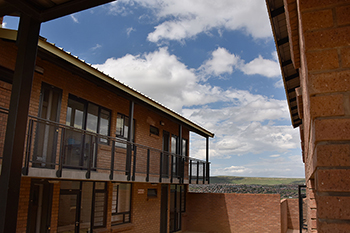Latest News Archive
Please select Category, Year, and then Month to display items
30 October 2018
|
Story Rulanzen Martin
|
Photo Peet van Aardt
 Some of the student writers who contributed to the anthology that tells their stories in Sesotho, isiXhosa, isiZulu, English and Afrikaans.
Some of the student writers who contributed to the anthology that tells their stories in Sesotho, isiXhosa, isiZulu, English and Afrikaans.
How do you transform the higher education curriculum? You involve the exact people the curriculum is intended for. The book, Initiative for Creative African Narratives (iCAN,) illustrates how decolonisation can be achieved through literature for students by students.
iCAN is an initiative by the Centre for Teaching and Learning (CTL) at the University of the Free State (UFS) to mentor students in creative and narrative writing. Under the mentorship of Dr Peet van Aardt, project coordinator, and Ace Moloi, author and UFS alumnus, iCAN Volume 1 was recently launched with 47 short stories written by UFS students.
“The project is a response from the centre for the ever-increasing need for decolonised curricula, steeped in the local cultural perspective of ubuntu,” said Dr Van Aardt.
“This book is an example for how decolonisation can be implemented,” said Prof Francois Stydrom, Senior Director of CTL. The overall aim of the iCAN project is to have the content that materialised from it to be included in the curriculum of first-year students at UFS in the near future.
Book provides multiple voices
Starting in May 2018, CTL presented a series of creative writing workshops on all three of the UFS campuses. “It’s a medium that allows a diverse range of students to express their views and develop their voices as writers,” said Prof Strydom.
It is a form of empowerment, to pass the baton to students to improve the UFS curriculum by writing and publishing their own stories, thereby contributing to larger bodies of knowledge through their lived experiences.
“I believe we as a university need to enable students so that they move away from just being users to becoming contributors to the curriculum,” Dr van Aardt concluded.
UFS Council approves proposals from the Naming Committee for the Bloemfontein and Qwaqwa Campuses
2016-07-20

New residence on the Qwaqwa Campus
Photo: Charl Devenish
During its meeting at the Bloemfontein Campus on Friday 3 June 2016, the Council of the University of the Free State approved the following proposals from the Naming Committee:
Bloemfontein Campus
- The Student Representative Council Building was renamed Steve Biko House.
- The amphitheatre was renamed Student Kgotla.
Qwaqwa Campus
- The Administration Building was renamed the Intsika Building.
- The amphitheatre was renamed the Chief Albert Luthuli Amphitheatre.
- The Dining Hall was renamed the Kopanong Dining Hall.
- The new Education Building was named the Sedibeng Education Building.
- The old Education Building was renamed the Kgorong Education Building.
- The Humanities Building was renamed the Mendi Building.
- The two new women’s residences were named the Fulufhelo Residence and Charlotte Maxeke Residence.
- The two new men’s residences were named the Khayelitsha Residence and Khayalethu Residence.
UFS Council approves name change of buildings and centres on the three campuses (23 February 2016)